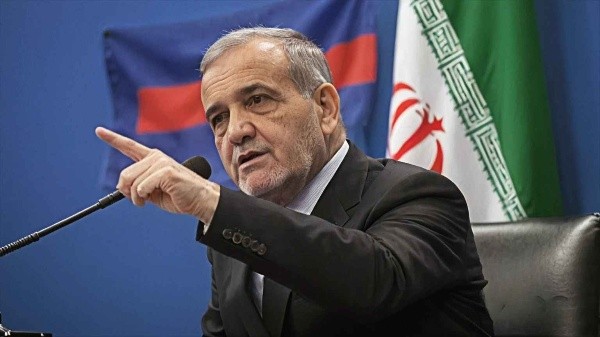Iran’s Unyielding Stance Against Israeli Aggression: A Complex Geopolitical Struggle
In the eyes of many, the Islamic Republic remains the last bastion in the Muslim world against unchecked Israeli aggression
Loading...

Here’s why the US and its allies are afraid of real military cooperation between Tehran and Moscow
Introduction
The geopolitical stage has been abuzz with allegations from the United States and its European allies accusing Iran of supplying ballistic missiles to Russia. These claims, initially propagated by major Western media outlets like the Wall Street Journal, Reuters, and CNN, suggest that Iran is supporting Russia in its military operations against Ukraine. The US Secretary of State, Antony Blinken, later affirmed these accusations, escalating tensions by imposing sanctions on Iran Air, and prompting European countries to suspend bilateral air service agreements with Iran.
Historical Sanctions and Iran's Resilience
Iran has long been familiar with sanctions, especially those targeting its main airline. Thus, Tehran is unlikely to be daunted by these recent moves. However, the situation highlights a recurring theme: the West's delay in normalizing relations with Iran, despite discussions around reviving the Joint Comprehensive Plan of Action (JCPOA) or the "nuclear deal." Iranian leaders, including President Masoud Pezeshkian, have firmly denied any missile transfers to Russia, maintaining a stance that prioritizes national interests and security over immediate economic benefits.
Iran's Strategic Alignments
Over the past decade, Iran has sought to alleviate Western sanctions and rebuild relations, primarily with the European Union. Russia has played a pivotal role in these negotiations, particularly leading to the 2015 nuclear deal. Despite these efforts, Iran remains more comfortable aligning with Russia and China, countries perceived as more reliable partners compared to the increasingly dependent Europe.
Iran's approach emphasizes self-reliance, a philosophy that has enabled the country to protect its identity and sovereignty over millennia. This self-sufficiency is evident in its defense industry, which Iran continues to develop independently, considering it vital for national survival and integrity.
Iran's Missile Program and Military Capabilities
Details about Iran's weapons production, particularly its missile capabilities, remain sparse and classified. Nevertheless, Western analysts estimate that Iran's missile arsenal includes both cruise and ballistic missiles with ranges extending thousands of kilometers. These capabilities have been developed in collaboration with China and North Korea, who have offered substantial support in technology and expertise.
Iran's military ambitions are reflected in its expansive military-industrial complex, which covers aviation, artillery, armored vehicles, munitions, electronics, naval construction, and chemical warfare. However, missile development remains a top priority. Iran has established approximately seven major centers for missile research and production, overseen by the Islamic Revolutionary Guard Corps (IRGC).
Shifting Western Perceptions
Initially, Western nations and regional adversaries viewed Iran's missile development with skepticism. This dismissive attitude stemmed from a belief that sanctions and technological isolation would hinder Iran's military advancements. However, as Iran's nuclear program progressed, Europe and other Western nations began acknowledging Iran's growing military capabilities, a development that particularly concerns Israel.
The current geopolitical climate, marked by tensions between Israel and Hamas, sees Iran's defense industry operating at near-wartime capacity. This situation is exacerbated by recent conflicts, including unprecedented strikes from Iranian territory against Israel and the assassination of a Hamas leader in Tehran. Israel's aggressive posture, including plans for a ground operation against Hezbollah, Iran's key regional ally, may compel Iran to respond forcefully.
Western Allegations and Iran's Stance
Despite President Pezeshkian's clear denial of arms supplies to Russia, Western countries remain unconvinced. Following the US's formal accusations, diplomatic engagements intensified, with meetings between US and UK officials and Ukrainian leaders. These discussions underscore Ukraine's desire to obtain long-range Western weapons for strikes deep into Russian territory, a strategy that hinges partly on the narrative of Iranian missile supplies to Russia.
This situation raises pertinent questions about the motives behind such allegations. Are these claims a pretext to justify Ukraine's expanded military operations? Western politicians are aware of the repercussions of permitting attacks on Russian soil, with Moscow signaling serious consequences.
The Double Standards of Weapon Supplies
Western warnings to Iran about supplying weapons to Russia are steeped in irony. The US and EU's continuous arms support to Ukraine raises questions about their own involvement in the conflict. If providing weapons implicates Iran, then the same logic applies to Western nations supplying Ukraine, thereby perpetuating the war.
Moreover, the right of Iran and Russia to cooperate in military and political spheres is an issue of sovereignty. Both nations, as independent entities, have the prerogative to enhance their bilateral relations. Current discussions about a comprehensive partnership agreement between Moscow and Tehran illustrate this point, suggesting deeper cooperation in security and strategic matters.
Conclusion
Despite Western attempts to coerce Iran with sanctions or incentives, Tehran remains skeptical about future collaboration with the US and its allies. Iran values its reputation as a steadfast partner and is more inclined to endure current challenges than anticipate Western engagement. The complex interplay of geopolitical interests, military capabilities, and strategic alliances continues to shape the narrative, with Iran asserting its independent path amidst global tensions.
Editor
In the eyes of many, the Islamic Republic remains the last bastion in the Muslim world against unchecked Israeli aggression
Analysts say US push for Gaza post-war phase is ‘unrealistic’ as Israel vows to continue fighting in besieged territory.
And recent Iraqi history can tell us how.
